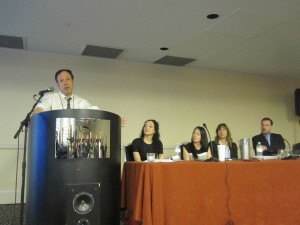
Scott Lilienfeld speaks with, from left, Ekaterina Pivovarova, Lyn Kiehl, Gina Vincent, and Joshua Buckholtz.
The science that makes it into the courtroom – whether outdated, cutting-edge, or not ready for prime time – has enormous impact on the lives of individuals every day across the world. Forensic psychologists, in effect, serve as courtroom gatekeepers for the science of human behavior. And while much of psychology has turned to the cognitive and behavioral neurosciences – i.e., how the brain generates thought and behavior – to understand behavior, brain-based science has yet to have a significant impact on the field of forensic psychology. CLBB had an opportunity to explore this important topic with a symposium at the 2014 meeting of the American Psychology-Law Society (AP-LS), the leading trade organization for forensic psychologists, which took place in New Orleans, Louisiana from March 6-8, 2014.
Organized and chaired by CLBB Fellow, Ekaterina Pivovarova, Ph.D., the symposium entitled “Application of Neuroscience Research and Techniques to Forensic Psychology” explored the neuroscience of deception, psychopathy, and substance abuse. In addition to Dr. Pivovarova, panelists included Joshua Buckholtz, PhD., a CLBB faculty member and Assistant Professor of Psychology at Harvard University; Gina Vincent, PhD., Director of Translational Law & Psychiatry Research and Associate Professor of Psychiatry at the University of Massachusetts Medical School; and Lyn Kiehl, M.A., J.D., a lawyer with a forensic psychology and behavioral neuroscience background focused on translation of neuroscientific research into effective legal practice and policy. Scott Lilienfeld, Ph.D., Professor of Psychology at Emory University and co-author of Brainwashed, was the panel discussant.
Here is an abstract of the symposium:
Over the last several decades, novel neuroscience techniques have begun to empirically examine the mysteries of human consciousness, cognition, and behavior. Unsurprisingly research findings from these scientific advances have begun to infiltrate the courtroom. Yet, this topic has received little to no attention in forensic psychology. This symposium seeks to provide an overview of the current neuroscientific literature on detection of deception, psychopathy, and substance abuse. We will examine the implications of these findings for the courtroom and what, if any, are the appropriate applications of this ever-evolving science to psycho-legal questions.
Each year the annual AP-LS meeting showcases new developments in psychological research, law, and policy, from forensic assessment to children and the law to how juries and judges make decisions. Please visit the AP-LS website to learn more about the 2014 meeting.



